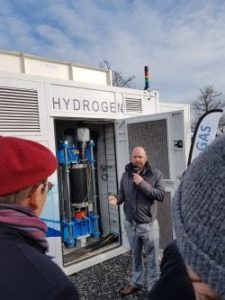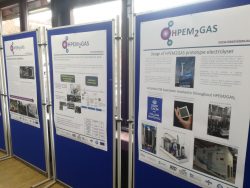Hydrogen-Powered Tractors and Agricultural Equipment: A Green Revolution in the Field

Introduction:
I’m Juan Antonio Roldán, a passionate advocate for hydrogen and its potential to transform agriculture. Today, we’ll tackle a crucial topic: Is hydrogen propulsion viable for tractors and agricultural equipment? The answer is a resounding yes, and I invite you to discover why.
Exploring a Green Future in the Field:
Imagine a field without polluting emissions, where agricultural work is carried out sustainably and efficiently. Hydrogen-powered tractors and agricultural equipment are not a distant dream but a reality already taking shape.
Advantages of Hydrogen in Agriculture:
- Zero Emissions: Hydrogen combines with oxygen in a fuel cell, producing only water as a residue. This means cleaner air and a reduced environmental impact.
- Energy Efficiency: Hydrogen systems are more efficient than traditional internal combustion engines, resulting in lower fuel consumption and greater cost savings.
- Less Noise: Hydrogen-powered vehicles are much quieter than traditional ones, improving working conditions for farmers and reducing noise pollution in the field.
- Reduced Maintenance: Hydrogen systems have fewer moving parts than internal combustion engines, reducing the need for maintenance and repairs.
- Versatility: Hydrogen can power a wide range of agricultural equipment, from tractors to harvesters.
Developments and Advances in Technology:
Various companies and institutions are working on the development of hydrogen-powered tractors and agricultural equipment. Some examples include:
- New Holland Agriculture: Has introduced a hydrogen-powered tractor prototype with a range of up to 12 hours.
- Kubota Corporation: Is developing a hydrogen tractor with a 50 kW fuel cell.
- JCB: Has unveiled a hydrogen-powered excavator prototype.

Challenges Ahead:
While hydrogen technology for agriculture holds great promise, there are still some challenges to address:
- Initial Cost: Hydrogen-powered vehicles still have a high price tag, limiting adoption by farmers.
- Refueling Infrastructure: The hydrogen refueling station network is still under development, making access to fuel difficult in some rural areas.
- Hydrogen Storage: Technologies for safe and efficient hydrogen storage need to be developed.
Conclusion:
Hydrogen-powered tractors and agricultural equipment are a viable and sustainable alternative to fossil fuels. As technology advances and costs decrease, hydrogen will play a crucial role in transforming the agricultural sector toward a greener and more efficient future.
Recommendations:
- Stay Informed: Keep up with research and advancements in hydrogen technologies for agriculture.
- Support Development: Advocate for governments and companies to invest in research and development of hydrogen technologies.
- Consider Adoption: If you’re a farmer, evaluate the feasibility of incorporating hydrogen-powered equipment into your operation.
Bet on a greener future in the field!
Useful Links:

























